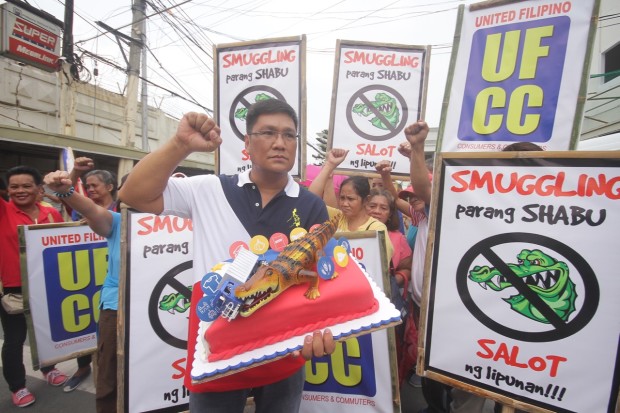Consumers group calls for ‘all-out war’ against smuggling

United Filipino Consumers and Commuters president Robert Javellana Jr. leads an antismuggling protest outside the Bureau of Customs in Manila on July 19. The crowd, expressing support for the Bureau of Customs’ antismuggling drive, gave Commissioner Nicanor Faeldon a cake topped with a toy crocodile and icons representing smuggled goods: vegetables, steel, and cement.
A consumers’ group has called for an “all-out war” against smuggling, saying it has a dire effect on the poorest members of the population “just like illegal drugs.”
Rodolfo “RJ” Javellana Jr., president of the civil society group United Filipino Consumers & Commuters (UFCC), said smuggling undermined state authority and government-led development by fueling corruption and hurting the economy.
“This in turn affects the livelihood opportunities and quality of life of Filipinos, especially the poor,” Javellana said in a statement.
The government estimates that it loses P547 million in revenues each day to smuggling, or P200 billion each year, according to Javellana.
“Ten thousand school buildings or a million low-cost houses could be built with P200 billion. This money could also be used to wipe out the budget deficit, which was P121.7 billion in 2015,” he said.
Article continues after this advertisementJavellana said he was encouraged by the hard stance promised by the new administration on crime, including smuggling, adding he visited the Bureau of Customs to offer the full support of UFCC to Commissioner Nicanor Faeldon for the government’s antismuggling drive.
Article continues after this advertisementSmuggling has long been a problem in the Philippines, said UFCC. In 2014, it said the US-based Global Financial Integrity reported that $410 billion in illicit transactions flowed in and out of the Philippines between 1960 to 2011.
UFCC said the amount lost to smuggling each year represented about 18 percent of the budget allotment for social services. This equaled to nearly a fourth of the allocation for economic services, including infrastructure, agriculture, and tourism, it said.
“It’s clear that smuggling can destroy just as many poor lives as illegal drugs. Jobs are lost and honest businesses are forced to close,” said Javellana.
Citing reports based on the United Nations Commodity Trade Statistics Database, UFCC said 721,000 tons of milled rice was smuggled into the country in 2014, representing P8.65 billion in lost tax revenues, while 75 percent of the 161,000 metric tons of cement imported in the first quarter of 2016 was found to have been either undervalued or misdeclared.
The smuggling of such goods not only distorted local prices, UFCC said, but it also introduced sub-par construction materials into the country.
Javellana said recent efforts to curb smuggling, however, had been made, including the signing into law of Republic Act No. 10845 in May. This classifies the smuggling of agricultural products worth at least P1 million as economic sabotage.
He also cited international organizations’ stance on how smuggling erodes governments’ sustainable development initiatives.
For instance, Javellana said, the UN General Assembly had stated that the illicit transnational trade in drugs and natural resources severely eroded social and human capital.
He also said the cost of doing business is driven up by smuggling, which makes it difficult for micro, small, and medium enterprises (MSMEs) to remain in business.
Trust in the democratic and criminal justice systems also suffers due to smuggling, said UFCC. The UN, it said, had pointed out that foreign investors lose confidence in countries where smuggling and other corrupt practices are rampant.
“For too long, Filipinos have been preyed upon by corrupt officials and unscrupulous traders,” said Javellana. “Enough is enough.” RC